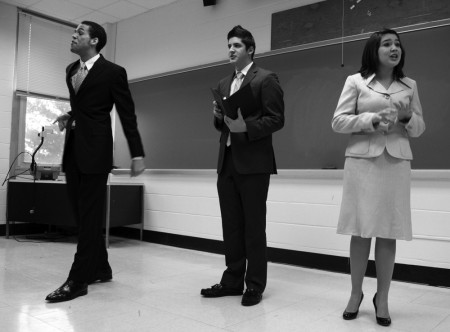
From left: Senior government and international politics major Dylan Johnson, freshman biology major Colby Hankey and freshman philosophy and government and international politics major Gabriela Barahona take part in a practice session for their individual events. Photo By Sean O’Brien.
George Mason University’s Forensics Team made their annual trip to Bradley University in Peoria, Ill., to compete in the L.E. Norton Memorial Tournament on Nov. 6-7.
The group finished second in the team sweepstakes portion of the tournament and had numerous successes at the individual level.
Each member of a competing team takes part in multiple events. The points earned by team members are added together for the team sweepstakes score, said sophomore communication and geography major Sean O’Brien, the co-historian of Mason’s Forensics Team.
O’Brien said the Forensics Team primarily competes in regional tournaments, making this one special due to its national prominence.
“The Norton is a great opportunity for the Forensics Team every year,” O’Brien said, “as it’s a very highly competitive tournament. We spend weeks preparing our events. It’s almost like a celebration, getting a chance to showcase the work we’ve done.
O’Brien said the 38-person group made the 14-hour drive to Peoria in university vans.
O’Brien took part in Prose Interpretation, Duo Interpretation, Dramatic Interpretation and Communication Analysis.
“The event that I was able to take further than preliminary rounds – because of my performance in those rounds as decided by judges – was Communication Analysis,” O’Brien said.
He said his Communication Analysis entry was a 10 minute prepared speech in which O’Brien analyzed an artifact of communication with a scholarly article serving as a frame for his discussion, he said.
Mason’s two first place finishes were freshman communication major Zach Eisenstein, who took first in the Novice Poetry Interpretation category, and freshman philosophy, government and international politics major Gabriela Barahona, who took first place in the Novice Extemporaneous Speaking category, according to the Forensic Team’s website.
Second place finishes included senior communication major Quincey Smith in Poetry Interpretation and in Persuasive Speaking, freshman biology major Colby Hankey in Novice Program Oral Interpretation and Eisenstein in Novice Informative Speaking.
“I thought the event, overall, was an amazing experience,” Eisenstein said. “It reaffirmed why I do what I do with forensics. The ability to perform and share what you’ve been working on with other people across the country is an indescribable experience.”
Eisenstein read four poems for the Novice Poetry Interpretation contest. The vocal performance of the poem is meant to back an argument.
“My argument deals with social stigmas and people who have been stigmatized through portrayal of characters who have been stigmatized,” Eisenstein said. “I’m arguing that people need to embrace stigmas in order to be empowered and not let them affect them negatively.”
In the Novice Informative Speaking contest, contestants were required to write a speech to inform people on a topic. Eisenstein chose a disease called congenital adrenal hyperplasia, an endocrine disorder that develops in fetuses which leave them with a high likelihood of becoming lesbians or displaying tomboyish behavior, he said.
“The ethical issue here is that there’s a treatment that doesn’t help cure the disorder,” Eisenstein said. “It eliminates the possibility that these girls could become homosexual or display tomboyish behavior.”






Comments